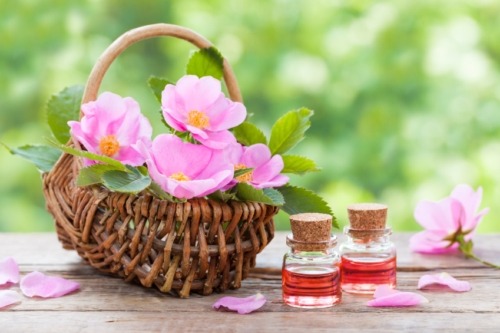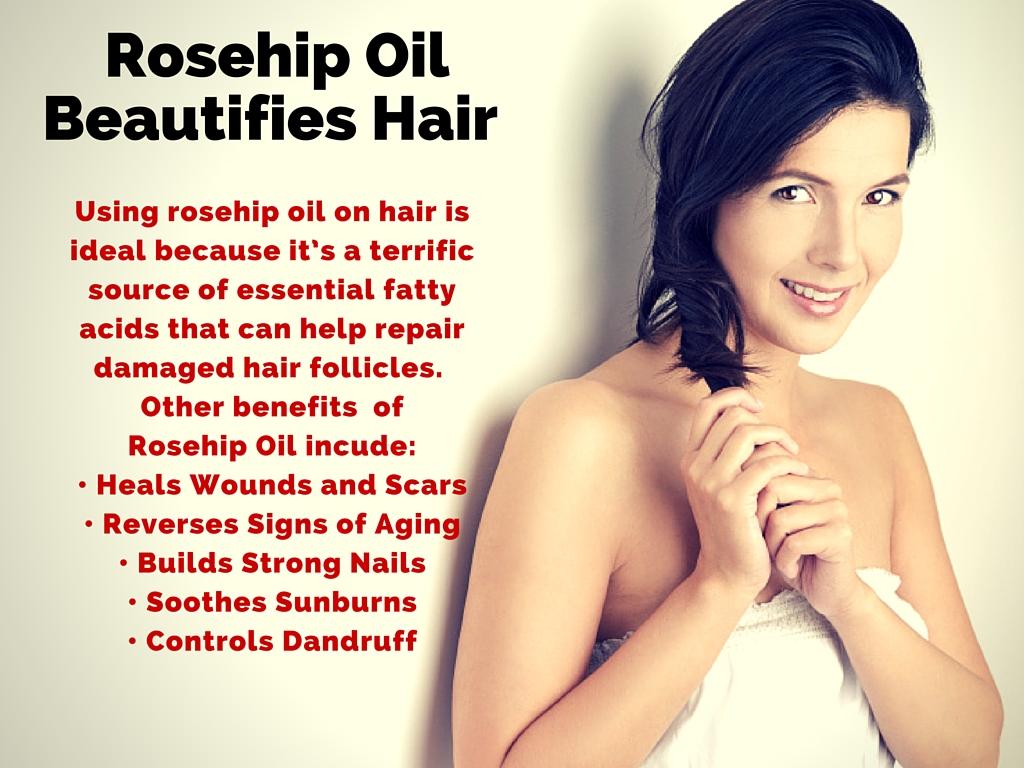 Rosehip oil is the latest natural product to become a favorite among celebrities (including Kate Middleton and Miranda Kerr) and regular folks alike.
Rosehip oil is the latest natural product to become a favorite among celebrities (including Kate Middleton and Miranda Kerr) and regular folks alike.
And it doesn’t come with a hefty price tag like so many beauty products do, which makes it easier for anyone to take full advantage of the its many benefits.
The Egyptians, Native Americans, and Mayans knew about the benefits of rosehip oil, but it’s only now that it’s starting to make real headway in America.
We always seem to be trying to find magic potions to combat aging and wrinkles, but in this case, nature got it right with rosehip oil, or at least pretty close to the mark, because of all of its wonderful benefits for hair, skin, scars, and acne, as well as its anti-aging properties.
Rosehip oil is made from the seeds of a particular species of rose, Rosa moschata; it’s predominantly grown in Chile, but also in South Africa and Europe. The oil can be used by itself or added to creams you already own, or you may find it as one of the ingredients in other skin care items. You can find rosehip oil at Whole Foods and health food stores.
What Makes Rosehip Oil So Beneficial?
Rosehip seed oil (1) is packed with vitamins A, C, and E, plus antioxidants and essential fatty acids that are all so good for the skin and hair. These elements are known to correct dark spots, hydrate dry skin, soothe itchy skin, and reduce the appearance of scars and wrinkles. It also has retinoic acid, which is known to reduce wrinkles and brighten skin—it’s no surprise, then, that rosehip oil reviews have been so positive!
Rosehip oil is a dry oil, so it penetrates the skin far better than a slick or slippery oil, as the latter oils tend to simply sit on the skin’s surface and not reach deep down. If an oil can’t get into the skin—that is, down into the dermis—it won’t provide the great results you’re looking for, namely, regenerating skin cells which in turn produces more collagen and elastin, two proteins required for plump, firm-looking skin. As we age, the skin on our faces loses both of these proteins resulting in loose, saggy skin.
Regardless of the type of skin or skin issues you have—young, aging, acne-prone, rosacea, dry, oily—rosehip oil can work for you and won’t aggravate those existing conditions any further. It’s especially beneficial to use rosehip oil for acne, because it helps to reduce the appearance of scars.
The Benefits of Rosehip Oil
1. Heals Wounds, Burns and Scars
Rosehip oil contains 77% fatty acids, which is essential in helping to repair skin membrane cells. When skin has been damaged, whether through burns, wounds, or acne, it needs a potent remedy to promote rapid healing. Rosehip oil is loaded with nutrients and proteins that will help cells regenerate.
2. Reverses the Signs of Aging
Without a doubt, the most raved-about and sought-after use for rosehip oil is on the skin. Because the oil is loaded with antioxidants and vitamins, and penetrates quickly, it’s great for reversing the signs of aging, including wrinkles, dark circles under the eyes, and tired-looking skin (2). Its antioxidants combat the free radicals which cause damage to skin cells, and its vitamin A content helps correct any skin tone issues and improves texture. The oil brightens skin, giving it a youthful, fresh glow.
3. Builds Strong Nails
Many people want to have beautiful nails, especially if their nails are prone to chipping and breaking. There are topical creams and polishes that can help strengthen nails, but rosehip oil offers a natural alternative. The vitamins and essential fatty acids in this oil can help keep nails strong. Rub some oil onto each fingernail every night before bed for healthy nails that will have a better chance of growing.
4. Soothes Sunburns
With summer around the corner, the chances of getting a sunburn are high if you go outdoors and don’t use sunscreen. Sunburned skin is damaged skin, so it needs help healing. Rosehip oil can deliver vitamins and essential fatty acids to the skin cells that need it. Apply the oil to a carrier oil, such as almond or jojoba, and apply wherever skin has been burned.
5. Beautifies the Hair and Heals the Scalp
Using rosehip oil on hair is ideal because it’s a terrific source of essential fatty acids that can help repair damaged hair follicles. It can also correct damage in scalp tissue, promote healthy hair growth, and help make your hair shiny. People who are experiencing hair loss could benefit from rosehip oil hair treatments. Hair elasticity is lost as we age, just like the elasticity in the skin on the face, and the fatty acids in rosehip oil can help increase it. Rosehip oil contains beta-carotene (which is why good quality oils have an orange hue), which balances oil production, so if you are prone to oily hair this might remedy the situation.
6. Controls Dandruff
Essential fatty acids are great for many parts of the body, including the scalp, and can be especially good in helping to control dandruff. Give yourself a soothing hair oil treatment by adding four drops of rosehip oil to half a cup of jojoba oil. Combine and then distribute evenly through damp hair, making sure to rub the mixture into the scalp.
Tips and Ideas for Rosehip Oil
Rosehip oil can be used in a number of ways to promote glowing skin and a healthy scalp. Here are a few tips on how to get the most out of your oil.
- Apply a few drops directly to affected skin and rub it in; this can be especially helpful for eczema and psoriasis. If you find that you’re sensitive to the oil, try mixing it with a carrier oil before applying it directly to the skin.
- Look for organic, solvent-free oil—you want the oil to be as pure as possible, so be sure to read the labels.
- Look for cold-pressed rosehip oil. This means it won’t have been heated in the preparation phase so the vitamins and essential fatty acids are preserved. It’s more expensive, but the results will be far better.
- Add a few drops to your shampoo or conditioner to get the benefits of the essential fatty acids that can help ease a dry, itchy scalp.
- Apply a few drops of oil after cleansing your face at night. Leaving it on overnight can promote further healing and treatment, as the oil sinks deep into the skin’s layers.
- Exfoliate your skin one to two times a week. This can be done with a warm facecloth or with a commercial product—but make sure it’s gentle and not made from the shells of crushed almonds or walnuts, for example, as this will scratch the fine layers of your skin and do more harm than good.
- If you have active acne that flares up quite prominently with open wounds, do not apply undiluted rosehip oil to the face. Wait until the worst of it heals over and then use rosehip oil on the acne scars.
- Vitamin E is often added to rosehip oil to prevent it from going rancid. It’s recommended that you store your oil in the fridge to preserve longevity.
Read Next:

